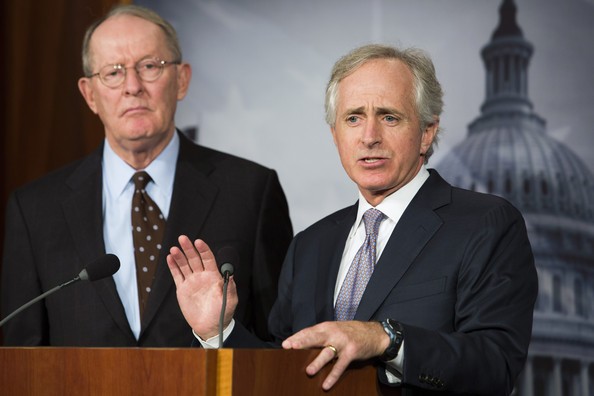Senator Lamar Alexander made two things clear during a stop in Memphis last Thursday: 1) that he’s running for reelection to the U.S. Senate seat he won back in 2002; 2) that he’s determined to do so from the political center, with minimal concessions to the orthodoxies of the Bush administration.
Both in remarks made to a sizable crowd of well-wishers at the Oaksedge Center in East Memphis and in the course of an interview afterward, Republican Alexander issued what sounded at times like a virtual declaration of political independence.
On Iraq, for example: “We need to get out of the combat business and into the support business,” the first-term senator and former governor said. Alexander said, “We’ve got to get the Iraq Study Group report off the shelf and use it for something other than a bookend.” The report, by a blue-chip bipartisan panel, advocated staged withdrawal from active combat operations in Iraq.
Of the current flap over the firing of eight U.S. attorneys by Attorney General Alberto Gonzales: “The administration is guilty of excessive partisanship. And the Democrats are guilty of excessive partisanship in response.”
On Bush’s recess appointment of Sam Fox as ambassador to Belgium, bypassing Senate confirmation: “The president has the right to do that sort of thing, but it’s inadvisable. Maybe if they [the executive branch] want to take some of our powers, we should take some of theirs.”
In his remarks to the crowd, Alexander pointedly reminded them of his experience as governor of Tennessee, when, he said, bipartisanship was the rule — beginning in 1978 when Democratic governor Ned McWherter helped get a newly elected Alexander sworn in early. That was to forestall potentially illegal pardons of state prisoners by his Democratic predecessor, Ray Blanton.
“I want to be one of the grownups who can work across party lines in the Senate to get things accomplished for people’s benefit,” said Alexander, noting that he and Connecticut Democrat Joe Lieberman have been presiding this year over a weekly bipartisan breakfast in Washington.
“We need to spend more time like this, working together on what really counts, and less time on petty, kindergarten games,” Alexander said. “I believe the most recent election was as much about the conduct of business in Washington as it was about the conduct of the war in Iraq.”
Recalling McWherter’s 1978 statement, “We are Tennesseans first,” Alexander said. “I’d like to hear a few more people in Washington say ‘We are Americans first.'”
Asked about the presidential prospects of his former Senate colleague from Tennessee, Fred Thompson, Alexander smiled and said, “The less he does, the more the buzz.” Thompson, who now stars in TV’s Law & Order, has acknowledged an interest in running but has so far taken no steps to do so. As Alexander, himself a two-time presidential candidate, noted, a significant draft effort is now under way, however. “I heard from my former Iowa campaign director who was interested in Fred.”
• Memphis’ 9th District congressman, Democrat Steve Cohen, availed himself of the current congressional recess to make a round of appearances in his home district.
At one such stop, last week’s Martin Luther King memorial awards dinner at the Convention Center, a Cohen invitee, Representative Maxine Waters (D-CA) extolled her Memphis colleague as “a real congressman … a real progressive” and made a point of calling him “brother” from the dais of the event. For a white man serving a predominantly black district, the remark by Waters, a highly respected African-American member, can only be helpful at reelection time next year.
Cohen was back at the Convention Center on Tuesday of this week as the featured speaker of the downtown Rotary Club. Like Alexander, Cohen, who voted with the congressional majority for a bill establishing a timeline for American withdrawal, viewed with alarm the prospect of continuing combat in Iraq. “We won the war. We’re in an occupation. We can’t win an occupation. We’re not on the scoreboard,” he told the Rotarians.
The congressman, a member of the House Judiciary Committee, also took note of the continuing local furor concerning what appears to many to have been much too light a sentence for Dale V. Mardis, who pleaded guilty in Criminal Court last week to the murder of code-enforcement officer Mickey Wright. (See Editorial, p. 18). In a plea-bargain arrangement, Mardis got 15 years for a crime that included dismembering Wright’s body, burning it with diesel fuel, and disposing of it across the state line in Mississippi.
“Mr. Mardis deserves more time,” said Cohen, who expressed the hope that federal prosecutors would initiate their own look at the crime to find other grounds, perhaps denial of Wright’s civil rights, on which to try Mardis. He said he had already begun working on federal legislation of his own that would criminalize the act of transporting a body across state lines to dispose of it.
• Longtime civic activist Mary Wilder was elected unanimously by the Shelby County Commission Monday as interim state representative from House District 89.
Wilder, 57, manager of a home-repair program for MIFA and a longtime member of the Vollintine-Evergreen Community Association, has been frequently mentioned over the years as a potential candidate for public office. Most recently, she was a candidate for the city Charter Commission last year. Though she will evidently serve for the duration of the current legislation session, Wilder will not seek the permanent seat, which was vacated recently when District 89 representative Beverly Marrero was elected to the state Senate.
Democratic and Republican primaries for District 89 will be held on Thursday, May 31st, with the general election following on Tuesday, July 17th. Kevin Gallagher and Jeannie Richardson are known Democratic candidates; so far, no Republican candidate has announced.
Filing deadline for that election will be Thursday, April 19th; withdrawal deadline with be Monday, April 23rd.
• Five veterans of the political world are apparently the finalists for the Shelby County Democratic delegation to choose from as new county election commissioners.
Shep Wilbun, former Juvenile Court clerk and a veteran of the Memphis City Council and the Shelby County Commission, is one of the five names to emerge from a meeting of the delegation in Memphis last week.
Others are current election commissioner O.C. Pleasant, who served several years as chairman of the body; Myra Stiles, a former longtime commissioner; Joe Young, a political veteran who, among other things, was for some years a field rep for former state Democratic chairman Jane Eskind; and Norma Lester, who is the current secretary of the Shelby County Democratic Party. The group of five was winnowed down from some 15 original applicants for the three positions available for Democrats.
One dissenting member of the delegation, however, said the list was not of finalists per se, contending, “It’s vaguer than that. It’s had to say exactly what the list represents.”
The original deadline for the Democrats to select the party’s three commissioners was April 1st; there was no word on when a final selection will occur. Republicans will return their two current members, Nancye Hines and Rich Holden.
• So what else is new? As reported last week, the Shelby County Democrats have a new chairman, for one thing. And last Thursday night chairman Keith Norman presided over his first formal meeting of the new party committee.
That’s when déjà vu set in: Committee member Jennings Bernard offered a resolution to expel newly elected lawyer Richard Fields from the committee on several grounds, including Fields’ public intervention in last year’s general election on behalf of Republican candidates for various offices. Fields was pressured into resigning from the committee in early 2006 for his legal work on behalf of Republican Terry Roland‘s challenge of the legitimacy of Democrat Ophelia Ford’s election to the state Senate. Norman set next month’s committee meeting as an occasion for voting on the resolution.


